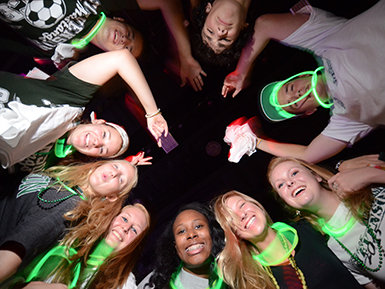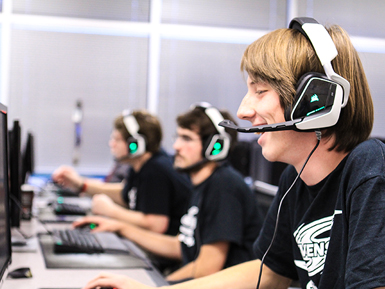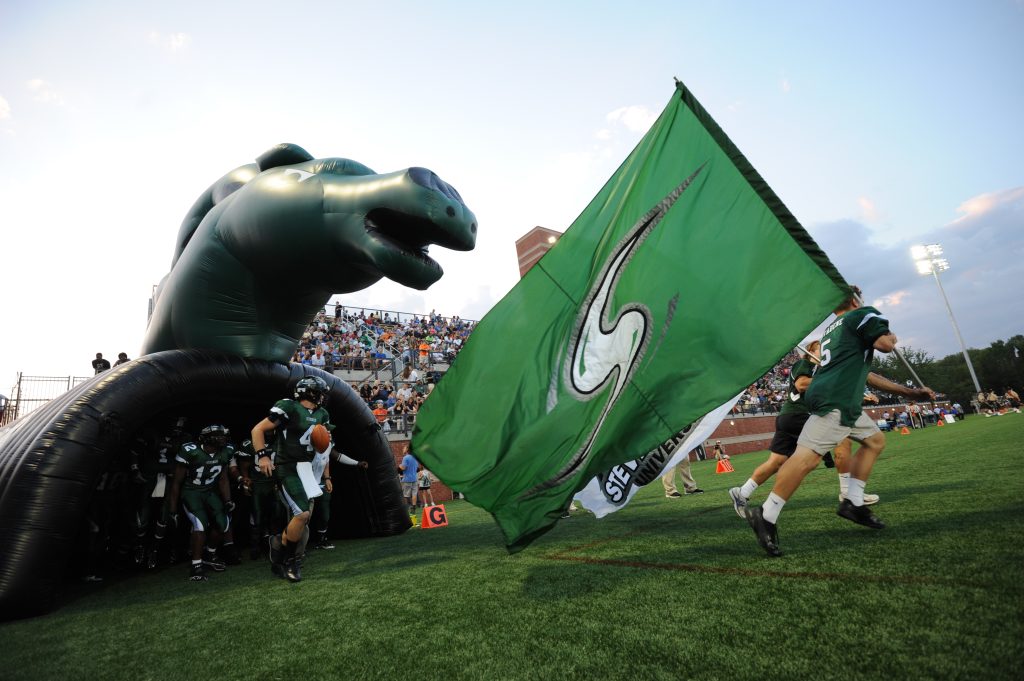Violations which could subject a student to disciplinary sanctions include, but are not limited to, the below list. Alleged violations of the Sexual Misconduct, Relationship Violence, and Stalking Policy as well as the Discrimination and Harassment Policy are addressed in formats that are different from what is described in this section. Please refer to the full list of University policies for a detailed description of these policies and procedures.
The University has the sole discretion to determine whether a violation of University policy or procedure is handled under the Academic Integrity Policy, the Conduct Policies for Students, or other policies or procedures.
Any student who may require accommodation(s) to navigate this process based on the potential impact of a disability should contact the Office of Accessibility and Disability Services to establish eligibility and determine reasonable accommodations. Examples of reasonable accommodations may include auxiliary communication aids, interpreters, and materials in alternative format. Stevenson University has no obligation to provide any accommodation(s) until a student has established eligibility with the Office of Accessibility and Disability Services. Accommodation(s) will not be made retroactively. To discuss possible accommodation needs please contact the Office of Accessibility and Disability Services, 443.352.5320 / ADS@stevenson.edu.
· Disruptive Student
· Drug, Alcohol, and Smoking Policy
· Ethical Violations (including lying, physical abuse, stealing, etc.)
· Failure to Comply
· Firearms and Weapons
· Tampering with Safety Equipment
· Good Samaritan
· Guests and Visitors on Campus
· Harm to Others
· Hazing
· Information Technology Acceptable Use
· Pets on Campus
· Social Media
· Tailgating
DISRUPTIVE STUDENT
Stevenson University is committed to the well-being and safety of its community members and the integrity of its learning environment. All members of the Stevenson community have the right to be free from actions or behavior that is disruptive, threatening or violent. Students who engage in behavior that significantly disrupts the learning environment or the residence facilities, or who engage in disruptive behavior on any property of Stevenson University or in any activity sponsored by Stevenson University, or who behave in a manner that is threatening to others or to Stevenson University property, or who engage in acts of violence, are subject to discipline, up to and including involuntary withdrawal from Stevenson University.
Each situation will be reviewed on a case-by-case basis. The facts of some behavior or events may result in a withdrawal that will be either indefinite in time or for a specified period of time, and the facts of other behavior or events may result in expulsion, which is a permanent removal from Stevenson University. A student who withdraws voluntarily or is dismissed or suspended may be eligible to apply for readmission to the University and/or to return to campus housing, if applicable. In such case, the student must show to the satisfaction of the Office of Student Conduct (or designee) that they are qualified to return to Stevenson University and ready to resume academic work, athletics, residence life and/or campus employment.
The Office of Student Conduct (or designee) has the discretion to determine in their academic and professional judgment what behavior is sufficiently disruptive, threatening, and/or violent to warrant the discipline or other action taken under this Policy. The Office of Student Conduct (or designee) is empowered by Stevenson University with the discretion to make the decision regarding discipline and other action, as well as any other decisions reasonably related. The decision of the Office of Student Conduct (or their designee) shall be the final decision on the discipline and other action under this Policy, subject only to an appeal to the University Hearing Board under the Stevenson University Disciplinary Procedures and Sanctions for Student Conduct Violations.
Any student being considered for return to Stevenson University following behaviors that are deemed to have been a direct threat to the health or safety of others will be based an individualized assessment based on reasonable judgment regarding the risk. The student must provide documentation acceptable to the University that the student is not a direct threat to the health or safety of others, along with written consent that the University may communicate with the provider of the documentation. Such communication may include, but is not limited to, current medical or psychological treatment and follow-up needs of the student. The documentation must confirm that the student is qualified and ready to resume academic work, residence life and campus life. An on-campus interview with the Office of Student Conduct (or designee) and the Assistant Vice President of the Wellness Center and/or other designated officials will be required.
DRUG, ALCOHOL, AND SMOKING POLICY
Please refer to the University’s Drug, Alcohol, and Smoking Policy.
ETHICAL VIOLATIONS
Ethical violations by a student which could subject the student to disciplinary sanctions include, but are not limited to, the following:
- Lying or knowingly furnishing false information, documents, or instruments of identification with the intent to defraud the University;
- Forging, altering, or misusing any University document, record, or instrument of identification;
- Harassment, including abusive or threatening language either verbal, in person, or through the telephone, or written through the use of the computer, or any other written form;
- Damaging, abusing, stealing, or misappropriating property, physical or electronic, or attempting to do so;
- Aiding another student in violating a policy, directive, or sanction;
- Failing to obey the directives and/or sanctions of the Office of Student Conduct, their designee, and/or the University Hearing Board or instituting a grievance hearing knowingly, without cause.
FAILURE TO COMPLY
Failure to comply with the directives (in person or in writing) of University employees who are acting in accordance with their roles. This policy also includes failure to identify oneself or provide identification to these persons when requested to do so.
Standard Sanction: may result in housing/disciplinary probation or suspension from residence halls and/or University.
FIREARMS AND WEAPONS
The possession of, distribution of, or the use of any firearm, weapon, deadly weapon, or other dangerous or flammable material (e.g. fireworks), including BB guns, any item that shoots projectiles and look-alikes, is strictly forbidden on the property owned or operated by the University. “Deadly Weapon” is defined to be any firearm, knife or substance or thing that, in the manner it is used, is intended to be used, or threatened to be used, is known to be capable of producing death or serious bodily injury.
Examples of firearms and weapons outlined in this policy include but are not limited to: knives with blades greater than three inches, all types of archery or martial arts equipment, bayonets, swords, rifles, guns, tasers, fireworks, firecrackers, bullets, gasoline, benzene, and similar items. Examples of other weapons or look-alike items include but are not limited to: airsoft guns, BB/pellet guns, paintball guns, Nerf blasters, gel shooters, laser tag, water guns, and similar items.
Campus Safety Officers, who are licensed to carry a firearm, are exempt from this policy. Additionally, the University reserves the right to permit limited use of certain items for recreational purposes at University sanctioned events.
Standard Sanction: may result in housing suspension and/or suspension/expulsion from the University.
TAMPERING WITH SAFETY EQUIPMENT
Tampering can include but is not limited to:
- Disconnection or the covering of smoke, carbon monoxide, and/or heat detectors/alarms;
- Misuse of fire extinguishers and/or fire suppression systems;
- Misuse of blue emergency call buttons;
- Removing, misusing, compromising, and/or relocating safety/traffic devices including but not limited to cones, barriers, chains, custodial signage, and related items ;
- Misusing or compromising any other safety equipment.
First time violators may be subject to:
- $250 fine and Formal Disciplinary Warning
Second time violators may be subject to:
- $500 fine and Housing/Disciplinary Probation
Student with subsequent violations may be subject to:
Increased fine, removal from residence and termination of Residence License Agreement, and/or suspension, and/or expulsion from the University.
Students who knowingly violate the smoking and/or no flame policies and trigger the fire alarm and/or students who intentionally activate a fire alarm may be subject to disciplinary action including but not limited to removal from the residence halls, termination of residence license agreement, fines, suspension, and/or expulsion. Students may also face criminal charges if applicable.
GOOD SAMARITAN POLICY
Stevenson University is committed to the health and safety of its students and strives to maintain policies that support this commitment. In an effort to maintain the health and safety of the campus community, the University has instituted this Good Samaritan Policy. Under this policy, students who seek medical attention for themselves or their fellow students related to consumption of alcohol or other drugs will not be charged with a violation of Stevenson University policies and/or the Guidelines for Student Housing. Students, however, may be required at the discretion of the Office of Student Conduct or designee to complete an alcohol assessment/alcohol education and/or a drug assessment/drug education program depending on the severity of the student’s situation.
Stevenson University prohibits the use of alcohol on campus for those under the legal drinking age of 21 and the use of unauthorized drugs. Alcoholic beverages are not to be furnished to, possessed or consumed by those less than 21 years of age. Students of legal drinking age may drink alcohol in their apartments/suites only if they are not in the presence of residents or guests who are under 21 years of age. The University recognizes that due to these prohibitions, students may unwisely choose not to call for medical assistance when another student is experiencing alcohol intoxication or a potential overdose situation due to the sanctions that the University might impose upon them. Should a student become intoxicated or involved in a potential overdose situation, Stevenson University implores individuals, regardless of age, to seek medical assistance for themselves or others in an attempt to keep the campus community safe.
This Good Samaritan Policy applies only to those students who seek emergency medical assistance in connection with an alcohol or other drug related emergency and does not apply to individuals experiencing an alcohol or other drug emergency who are found by University personnel (e.g., Campus Safety, Residence Life, University administrators). Similarly, the Good Samaritan Policy only applies to alcohol and other drug related emergencies and does not apply to other unacceptable forms of behavior such as assault, property damage, or distribution of illegal substances. Likewise, the Good Samaritan Policy does not prevent action by police or other law enforcement personnel who are required to abide by Maryland State law.
Stevenson University students are expected to act responsibly. In cases where repetitive violations of Stevenson University’s policies and/or Guidelines for Student Housing occur, the Office of Student Conduct or designee reserves the right to take judicial action on a case-by-case basis regardless of the manner in which the incident was reported.
GUESTS AND VISITORS ON CAMPUS
At Stevenson, we are committed to providing a safe and welcoming environment for all guests and visitors. As a private institution, we reserve the right to ask guests or visitors who violate our policies or the law to leave the property immediately. Students who bring guests onto campus are responsible for their actions. Guests may be permitted to attend classes with the advance permission of the instructor. Residential students are also required to follow the guest policy detailed in the Residence Life Procedures and Guidelines.
HARM TO OTHERS
Any physical abuse and/or endangerment to an individual or group, whether on or off-campus, is prohibited including, but not limited to:
● physically abusing or verbally abusing any person;
● threats or intimidation of such harm;
● endangering the health and safety of others.
Standard Sanction: may result in disciplinary probation, housing suspension, or suspension/dismissal from University.
HAZING
Hazing by any group or organization is not allowed at Stevenson University. Hazing is defined as any action or activity taken or situation intentionally created, whether on or off campus, that produces mental or physical discomfort, embarrassment, harassment or ridicule, or any form of violence, abuse, or failure to accord to any student the dignity due the student. Consent, explicit or implied, does not exempt any organization from this regulation.
INFORMATION TECHNOLOGY ACCEPTABLE USE
Please refer to the University’s Acceptable Use Policy.
PETS ON CAMPUS
Please refer to the University’s Pet Policy.
SOCIAL MEDIA
Please refer to the University’s Social Media Policy.
TAILGATING
Please refer to the University’s Tailgating Policy.
DISCIPLINARY PROCEDURES AND SANCTIONS FOR CONDUCT VIOLATIONS
Students accused of conduct violations of University policy are normally required to attend and participate in a Disciplinary Conference with a hearing officer. Students have the right to appeal the outcome of that Disciplinary Conference as provided in this policy.
Additionally, students have the right to establish eligibility and determine reasonable accommodations to navigate this process based on the potential impact of a disability. Examples of reasonable accommodations may include auxiliary communication aids, interpreters, and materials in alternate format. Stevenson University has no obligation to provide any accommodation(s) until a student has established eligibility with the Office of Accessibility and Disability Services. Accommodation(s) will not be made retroactively. To discuss possible accommodation needs please contact the Office of Accessibility and Disability Services, 443.352.5320 / ADS@stevenson.edu.
These procedures do not apply to a student whose conduct or presence on campus is determined, in the discretion of the Office of Student Conduct, the Dean of Students, Campus Safety, or another official of Stevenson, to be dangerous to other persons or the University or its property, or who has repeatedly disrupted or threatened to disrupt the educational process or University operation. In such cases, Stevenson reserves the right to resolve a case and sanction the student, including but not limited to suspension or expulsion from the University, without a hearing; such decisions will be made by the Office of Student Conduct (or designee).
Notice of the Charges
The student accused of violating University policy (sometimes referred to herein as “respondent”) shall be notified of the charges by the person or University entity instituting the charges.
Interim Suspension
In certain circumstances, the Office of Student Conduct (or designee) may impose a University or residence hall suspension prior to the student’s Disciplinary Conference. Interim suspension may be imposed:
· to ensure the safety and well-being of members of the University community or preservation of University property; or
· if the student poses an ongoing threat of disruption of, or interference with, the normal operations of the University.
During the interim suspension, a student shall be denied access to the residence halls and/or to the campus (including classes) and/or all other University activities or privileges for which the student might otherwise be eligible, as the Office of Student Conduct (or designee) may determine to be appropriate.
Whenever an interim suspension is imposed, a Disciplinary Conference will be scheduled at the earliest time reasonably possible. The interim suspension may remain in effect until a final decision has been reached, including any appropriate appeals process.
Disciplinary Conferences
- Hearing. The Office of Student Conduct determines who will hear a case for the alleged violation. Cases are typically heard by the Director of Student Conduct, Student Conduct Officer, Residence Life staff member, or their designee. The Office of Student Conduct has the discretion to appoint a different hearing officer and/or a second hearing officer in cases for which, in their judgment, it is warranted; including but not limited to, in cases that are complicated or otherwise unusual.
- Notice. Respondents are contacted, normally by email or in person, by the Director of Student Conduct, Student Conduct Officer, Residence Life staff member, or their designee in order to schedule a Disciplinary Conference, which normally will be held in Ratcliffe Community Center.
- Failure to Appear. A respondent’s failure to appear for the conference after receiving notice normally will be deemed to be an election by the student to not challenge the charges, and the charges will be sustained. However, a respondent may appear but choose to not make any statement or otherwise provide information in response to the charges; in that instance, the conference will proceed and a determination on the charges in the Notice will be made by the hearing officer without the input of the respondent.
- Format of Disciplinary Conference. Conferences will be directed by the hearing officer who will preside throughout the conference. All decisions regarding the nature of the conference, including whether to meet in person, phone or via video-conferencing, the number of witnesses, the order in which witnesses will be heard, the length of the interviews, any procedural and logistical matters, and what information is reasonably necessary in reaching a fair decision, are within the discretion of the hearing officer. There are no formal rules of evidence. The conferences will not be recorded by Stevenson, and no one will be permitted to make a recording. Any participant may take notes when permitted to be present. No party or other witness will be present during the interview of any other party or witness. This includes, but is not limited to parents, family, friends, attorneys, lawyers, other students, etc. The conference is closed to the public.
- Information Provided. Respondents and witnesses are required to provide truthful information, and any violation will be governed by and disciplined under Stevenson’s policies.
- Determination. After the conference, the hearing officer will determine whether or not to find the respondent responsible and then will issue sanctions that in their judgment are appropriate. The respondent is then notified in writing of the decision and the sanction(s) imposed, if any. That decision will normally be provided to the respondent within five (5) business days after the conference is completed.
- Preponderance of Evidence. The hearing officer makes the decision using the preponderance of evidence standard.
- Final Decision. The decisions made by the hearing officer are final, pending the normal appeal process (see Appeal Process below for more information).
Sanctions
Stevenson recognizes that the goals of discipline are education and deterrence. In this spirit, the following sanctions, although not inclusive, may be recommended or imposed as appropriate by either the Director of Student Conduct, Student Conduct Officer, Residence Life staff member, or their designee. More than one of the sanctions may be imposed for any single violation.
- Verbal Warning. The respondent will receive verbal notice that he/she has violated University regulations and/or policies and continuation or repetition of the violation may lead to more severe disciplinary action.
- Written Warning. The respondent will receive written notice that he/she has violated University regulations and/or policies and continuation or repetition of the violation may lead to more severe disciplinary action.
- Restitution. The respondent shall be liable for reimbursement for any damage of or misappropriation of either individual and/or community property. Forms for reimbursement may include appropriate service to repair or monetary compensation. Failure to make restitution within a reasonable time period can lead to further disciplinary action by Stevenson.
- Disciplinary Probation. A written reprimand for violation of specified regulations. Probation is for a designated period of time and includes the probability of more severe disciplinary sanctions if the respondent is found to violate any institutional regulation(s) or the Student Policy Manual during the probationary period.
- Parental Notification. Notification may be made to the parents/legal guardians of the respondent regarding the incident and the sanctions being imposed.
- Residence Hall Suspension. The respondent may be separated from the residence halls for a finite period of time, after which the respondent is eligible to return. Conditions for readmission may be specified in writing to the respondent.
- Suspension. The respondent shall be excluded from classes and/or extracurricular activities and shall lose all rights and privileges of a student in good standing, and denied access to residence halls and/or the campus and/or all other University activities or privileges for which the student might otherwise be eligible. The term of suspension and the conditions for readmission shall be stated in the notice of suspension. As noted above, immediate Interim Suspension may be imposed during the course of an investigation at the discretion of the Office of Student Conduct (or designee).
- Dismissal. The respondent shall be terminated from the University for an indefinite or specified period of time and may be readmitted to the University only with the specific approval of the Executive Vice President for Academic Affairs and Provost, Vice President of Student Affairs, and the Office of Student Conduct..
- Expulsion. The respondent shall be terminated from the University permanently without the possibility of readmission to the University.
Appeal Process
- Right to Appeal. A decision reached by a hearing officer may be appealed. A request for an appeal must be submitted in writing to the Office of Student Conduct within five (5) business days of the decision. The Office of Student Conduct will forward the appeal to the correct appeal hearing officer.
- Grounds for Appeal. The written request for an appeal must be based upon one or more of the following grounds, and there are no other grounds for appeal:
- A procedural error that significantly impacted the final decision;
- Previously unavailable, substantive and relevant information that could materially impact the final decision; and
- The sanctions or discipline imposed is substantially disproportionate for the facts of the case for the violation that was found to have occurred.
- Procedure for Hearing. When an appeal is permitted, the normal procedure for determining who hears the appeal is as set forth in the chart below:
Original Hearing Officer | Appeal hearing will generally be heard by: |
Residence Life Staff Member | Student Conduct Officer (decision is final) |
| Student Conduct Officer | Director of Student Conduct (decision is final) |
Director of Student Conduct | VP, Student Affairs (decision is final) University Hearing Board (decision is final) |
The case will be considered closed when (1) a person or entity designated in the chart above concludes that no appeal is permitted or hears the appeal and rules for or against the respondent, or (2) when the case reaches a stage in the chart above which states that the “decision is final.”
* When the appeal is from a decision by the Director of Student Conduct to suspend or dismiss a student from the University or to remove a student from University residence halls, the VP, Student Affairs will determine whether the appeal will be heard by the VP, Student Affairs or by the University Hearing Board.
- Appeals Other than to the University Hearing Board. When an appeal as provided in the “Appeal Process” section is to be heard by the Student Conduct Officer, Director of Student Conduct, or VP, Student Affairs, the procedures for the hearing are the same as those set forth in the “Disciplinary Conference” section, items “2” through “6”.
UNIVERSITY HEARING BOARD
The University Hearing Board receives its authority from the President of the University. It shall consist of at least twelve members (students, faculty, administration, staff). At least five of these members shall be designated by the President to sit on the Board at any one time. The members, representing administration, faculty, staff, and students shall be nominated through the Student Services Board of the Faculty Council and shall be appointed by the President of the University. A Chairperson shall be selected by the President. The members shall serve for a one-year term.
- Jurisdiction. The jurisdiction of the University Hearing Board is to hear appeals of charges of student conduct violations of established policies and regulations in accordance with the appeals process described above.
- Procedures. The University Hearing Board shall adhere to the following procedures in hearing appeals of charges of student conduct violations of established policies and procedures:
- Notice. Promptly upon receipt by the Board Chairperson of a written request for a hearing, written notice shall be given to the person filing the appeal (the “appellant”) and any student who is accused, of the date and time of the hearing and the allegations on which the matter is based or the specifics of what action is requested.
- Burden of Proof. The burden of proof shall rest upon the appellant.
- Advisor. The appellant and any other student who is a party to the proceedings such as an accused (but not people who are only witnesses), has the right to be assisted by an advisor from the University community whose role is to meet and discuss the case with the student he/she is advising prior to the hearing. The advisor has no standing in the proceedings, however, may provide advice to respective student in a quiet manner that is not disruptive to the proceedings. Advisors cannot be lawyers/attorneys and are not permitted to speak or participate directly in the hearing.
- Format of Hearing. Hearings will be directed by the hearing officer who will preside throughout the hearing. All decisions regarding the nature of the hearing, including whether to meet in person, phone or via video-conferencing, the number of witnesses, the order in which witnesses will be heard, the length of the interviews, any procedural and logistical matters, and what information is reasonably necessary in reaching a fair decision, are within the discretion of the hearing officer. There are no formal rules of evidence. Any participant may take notes when permitted to be present. The hearing is closed to the public.
- Witnesses and Evidence. The appellant and the University shall have the privilege of presenting witnesses, who may be asked questions by the Board. Pertinent records, exhibits, and written statements may be accepted as evidence for consideration by the Board at the discretion of the Chairperson. Written statements of others may be admitted into evidence only if signed by the person submitting the statement and witnessed by the Office of Student Conduct or another person acceptable to the Board.
- Record of the Hearing. The hearing will not be recorded by Stevenson, and no one will be permitted to make a recording.
- Confidentiality. The information presented at the hearing will be regarded as confidential.
- Decision of the Board. The Board will make its decision by a majority vote of the Board members who vote. The Board will issue a written finding regarding the appeal. The Board shall issue sanctions, if any, that it deems to be appropriate in the event that the Board finds that the appellant has violated a University policy.
- Final Decision. The decision of the University Hearing Board shall be final.
- Failure to Appear. An appellant or an accused student who is a subject of the appeal who fails to appear for the hearing after receiving notice normally forfeits their own right to a hearing or appeal. However, an appellant or accused student may appear but choose to not make any statement or otherwise provide information on their own behalf; in that instance, the hearing will proceed and a determination on the appeal will be made by the Board without input from the appellant or the student who is a subject of the appeal.
- Information Provided. Appellants, accused students and witnesses are required to provide truthful information, and any violation will be governed by and disciplined under Stevenson’s policies.
(Updated October 2023)






